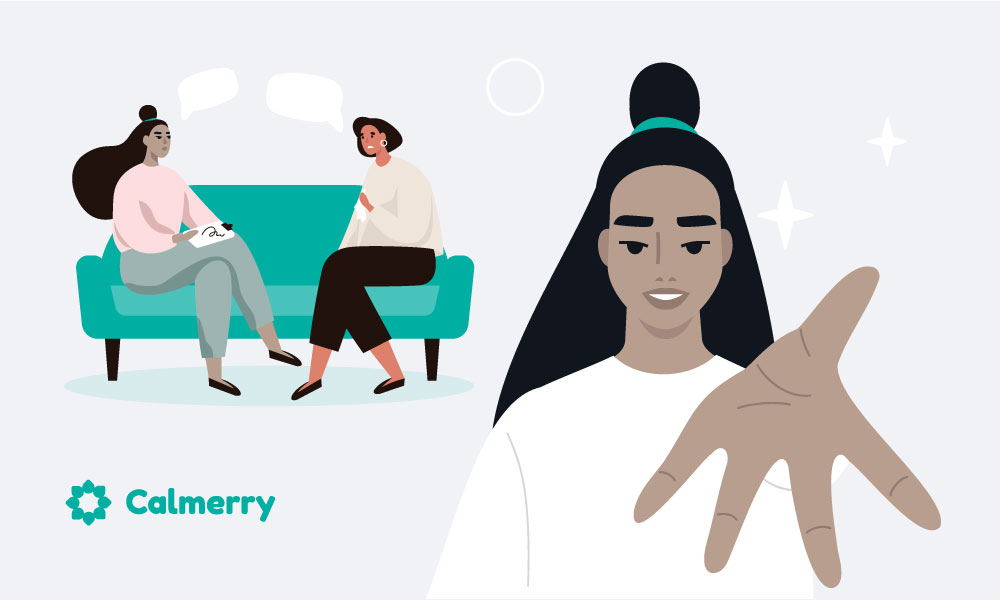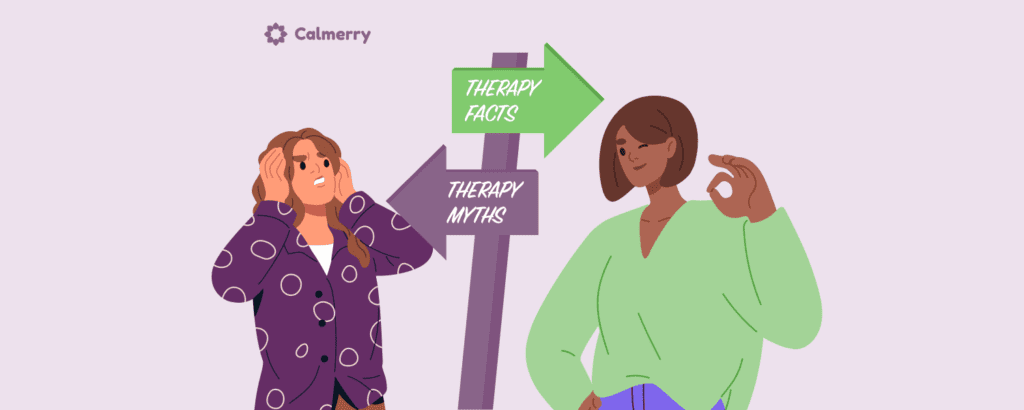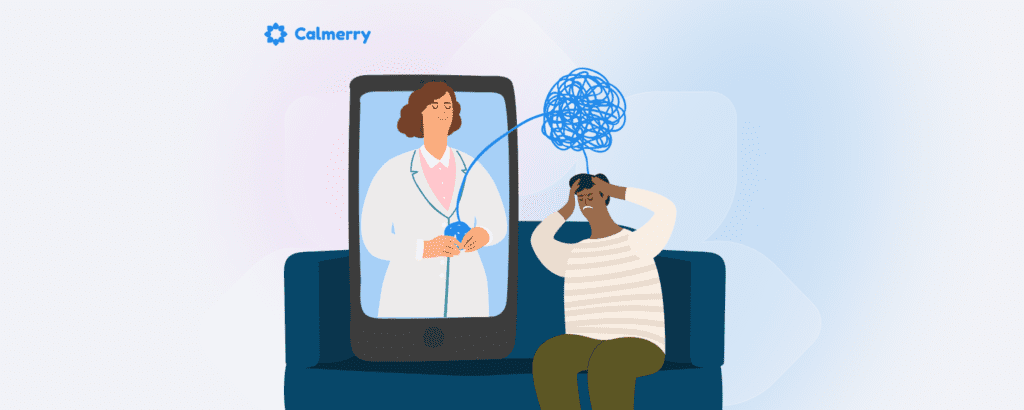AI vs Human Therapy
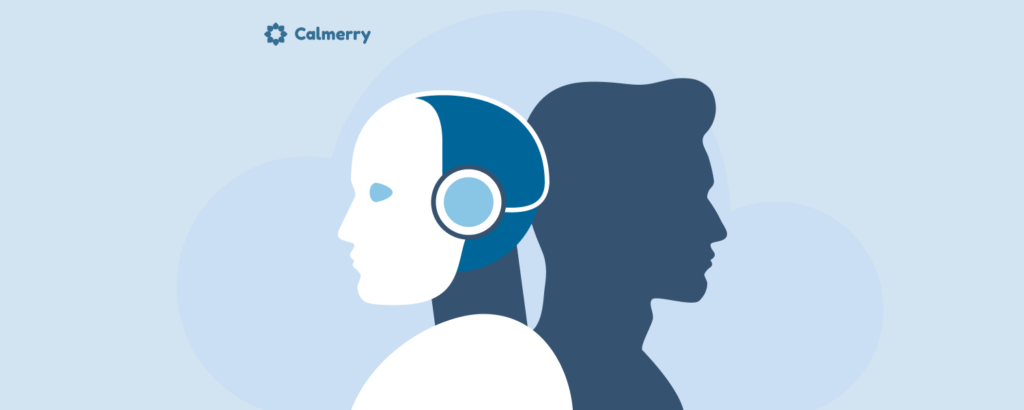
In this article
Therapy is no longer bound to the classic office appointment. AI-driven therapy platforms and tools have become a part of our lives, and mental health assistance is no exception. Licensed professionals are providing virtual sessions to AI chatbots, walking people through mood tracking and journaling. Still, the question remains: will AI replace human therapists in 2025, or assist them?
This article examines the fundamental differences, advantages, and limitations of both AI and human therapy and what they hold for the future of mental health care.
The rise of digital therapy
How therapy has evolved
Mental health care has moved from office visits to online support, making it easier and more convenient to access help. Teletherapy uses AI, chatbots, and asynchronous technology. It allows people to connect whenever it suits them. This is part of a broader trend in mental health care.
Mental health apps of today incorporate cognitive behavioral therapy (CBT), mood tracking, and journaling. AI in teletherapy evolution introduces tools such as virtual assistants and AI chatbots for mental health assistance, adding structure and scalability. This revolution paved the way for the provision of hybrid AI-human and AI counseling.
Calmerry’s role in accessibility
Calmerry enhances mental health care access through the integration of licensed professionals with adaptable, internet-age tools. Therapy comes through video and messaging, and the platform provides a way to reach support without geographic and scheduling constraints.
In prioritizing AI therapy accessibility, affordability, and continuous 24/7 delivery of AI therapy, costs become less of an issue, and reach is extended. It’s a model for teletherapy’s evolving AI direction with clinical quality front and center.
What is AI therapy?
Defining AI therapy
AI therapy is the mental help being offered through AI chatbots, virtual assistants, and predictive algorithms. It utilizes natural language processing, including machine learning, to emulate therapeutic experiences, track emotional patterns, and offer coping mechanisms.
AI tools like Woebot and Abby indicate the rising AI mental health apps landscape, which also comprises mood, habit tracking, and AI-aided CBT sessions.
Yet the scientific research on the effectiveness of AI therapists, as well as the discussions about ethical issues in AI mental health support, still informs the practice of such tools within the confines of the practice environment. [1] Babu, A., & Joseph, A. P. (2024). Artificial intelligence in mental healthcare: transformative potential vs. the necessity of human interaction. Frontiers in Psychology, 15. https://doi.org/10.3389/fpsyg.2024.1378904
Benefits of AI therapy
Here are the most common AI therapy advantages to consider:
- Scalability and affordability: AI counseling programs scale effectively across user bases, providing inexpensive mental health care. Apps such as Woebot are among the best AI therapy programs that were created keeping AI therapy cost benefits as well as universal access to such tools.
- 24/7 availability and instant responses: AI mental health tools support users at any time, delivering fast feedback.
- Journaling, habit tracking, and mood tracking: Chat-based mental health platforms based on artificial intelligence often have journaling and mood tracking included, allowing for personalized AI mental health plans as well as supplementing the classical techniques.
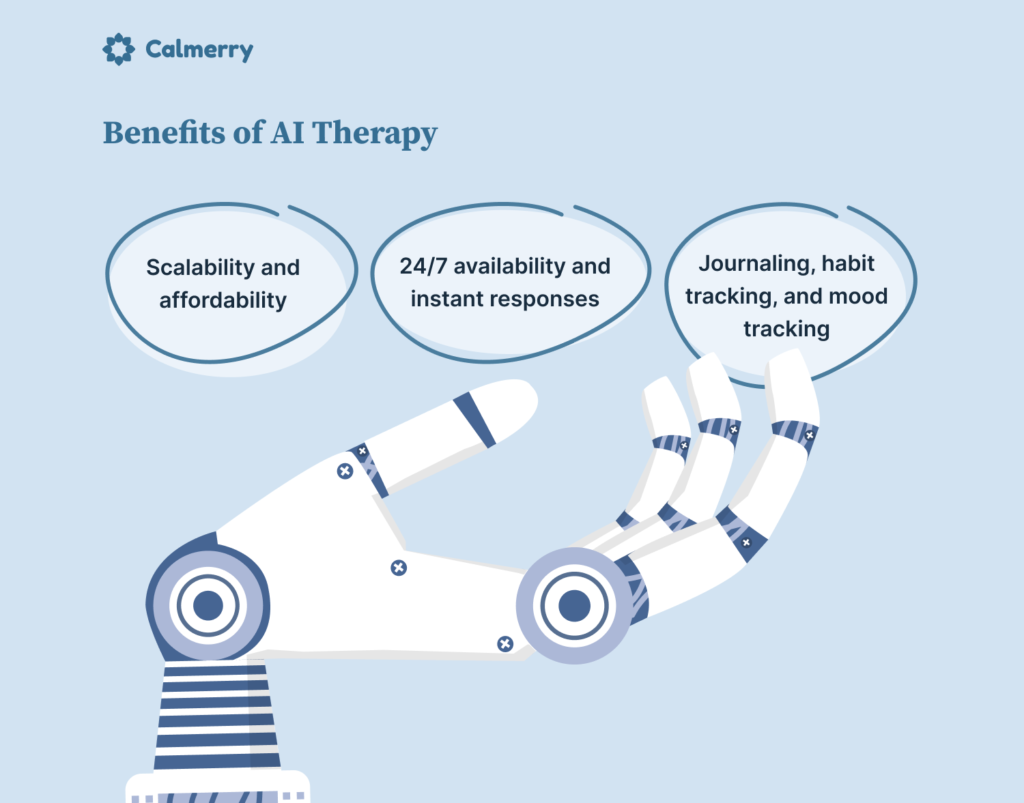
Limitations of AI therapy
While artificial intelligence counseling apps offer convenience and accessibility, they face the limits of AI in therapy that impact their effectiveness and scope of use:
- Lack of emotional depth: AI chatbot therapy can simulate conversation but lacks genuine empathy, human intuition in therapy, and the nuanced understanding needed for complex emotions.
- Ethical concerns and data privacy: AI therapy ethical concerns include risks of data breaches, opaque algorithms, risks of unregulated AI chatbots, and limited accountability in AI mental health tools.
- Inability to handle complex mental health conditions: artificial intelligence in mental health support is not equipped to manage severe issues like trauma, suicidal ideation, or personality disorders, where human therapy is critical.
- AI can’t get licensed: Legal limitations of AI therapists mean they cannot meet professional licensing standards, raising questions about the comparison of counseling chatbots and clinical accountability.
What is human therapy?
Defining traditional therapy
Conventional therapy is where people meet privately with licensed specialists. They practice evidence-based techniques, such as cognitive behavioral therapy. While there are controversies regarding whether AI will be a substitute for therapists, the contrasts between AI and human specialists are evident. This occurs most significantly in crisis counseling, professional standards, and customized mental health attention.
Benefits of human therapy
Human therapy delivers depth and accountability that even the best AI therapy apps like Woebot can’t match, especially in complex care. Here are the most common human therapist benefits:
- Licensed specialists: Certified to treat diverse conditions using clinical methods.
- Emotional nuance, empathy, and trust: Core to human counseling, unlike AI virtual assistants for mood tracking, which face limitations of AI empathy.
- Personalized care and clinical expertise: Tailored treatment beyond algorithmic suggestions, avoiding bias in AI therapy algorithms.
- Crisis support and ethical accountability: Immediate, trained response, unlike how AI therapy handles crises under current regulations and laws.
In the debate over choosing between AI and licensed therapists, human empathy in counseling remains irreplaceable despite the growing role of Calmerry AI-enhanced human therapy.
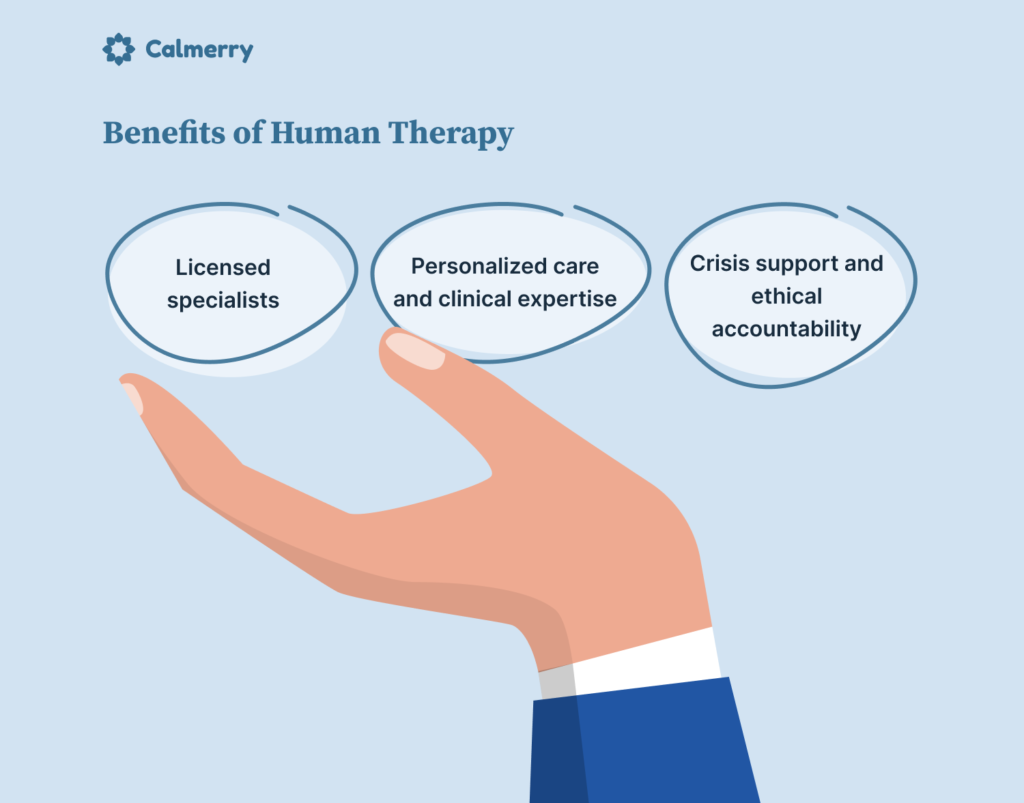
Calmerry’s human-first approach
Calmerry believes AI can’t replace therapists. The dangers of AI therapy, including privacy risks and a lack of regulation, raise concerns. As the future of AI in mental health care unfolds, Calmerry prioritizes licensed care over chatbots.
Head-to-head comparison: AI vs human therapy
The growing use of AI in mental health raises practical and ethical questions. While the advantages of AI therapy apps are clear, concerns remain.
| Feature | AI Therapy | Human Therapy |
|---|---|---|
| Availability | 24/7 | Scheduled |
| Cost | Low | Varies |
| Empathy | Simulated | Genuine |
| Personalization | Algorithmic | Deeply tailored |
| Crisis Support | Limited | Trained response |
As hybrid models emerge, the future of AI in counseling appears supportive, rather than substitutive.
Summary of key differences
Here is a quick summary of the differences between digital therapy vs traditional therapy :
AI counseling offers low-cost, always-on support ideal for beginners and those managing mild symptoms. Benefits of AI include mood tracking, journaling tools, and instant feedback. Best AI therapy apps integrate CBT-style prompts and habit support. Still, limitations include a lack of empathy, AI therapy privacy issues, and an inability to handle crises.
Can AI and human therapists work together?
Hybrid therapy models
Hybrid models use AI-assisted CBT sessions, chatbots, and mood tracking to support therapists with pre‑session data and ongoing monitoring. Research on integrating AI with journaling tools shows improved human vs AI therapist outcomes for mild anxiety and depression, but AI lacks deep empathy. [2] https://archive.logos-science.com/index.php/conference-proceedings/article/download/2760/2799/2832
Legal limitations of AI therapy
As AI mental health tools gain popularity, state regulations are tightening. Illinois, Nevada, and Utah have passed laws forbidding AI counseling without licensed professional oversight. These rules limit AI use to administrative tasks and ban therapeutic decision-making by bots.
Investigations have exposed cases where AI chatbots, including ChatGPT-style systems, provided unsafe advice, fueling debates around accountability in AI mental health tools and privacy concerns. For anyone evaluating digital care options, a thoughtful therapy chatbot comparison must now consider not only features and user experience but also compliance with emerging legal frameworks.
Experts warn that the long-term effects of AI therapy remain unknown, while legal boundaries remain fragmented. [3] Griesser, K. (2025, August 27). Your AI therapist might be illegal soon. Here’s why. CNN. https://edition.cnn.com/2025/08/27/health/ai-therapy-laws-state-regulation-wellness The future of AI in psychotherapy depends on clear standards for safety, ethics, and claims.
Future of therapy: collaboration, not competition
The evolving role of AI
Evolving role of AI in mental health care, transforming counselling through the provision of augmentation. Tools like Woebot offer immediate and formatted assistance for mood tracking and journaling. They do come with a question concerning clinical richness and emotional understanding.
State laws governing AI counseling will continue to evolve until 2025. This will be for tackling ongoing areas of concern around efficacy, AI-human therapy stigma, and full-scale automation risk.
Human connection remains central
Empathy, trust, and clinical judgment are central to therapy. Human therapists offer depth that AI lacks, especially in complex care.
Questions like “can AI replace therapists?” highlight ongoing concerns. As state regulations on AI therapy in 2025 develop, human connection remains essential.
Calmerry’s approach: tech-enhanced human care
Platform features
Calmerry combines licensed care with scalable digital tools to expand access and reduce stigma in virtual therapist vs human therapist outcomes.
The platform integrates:
- Secure messaging and scheduled video sessions with licensed therapists
- AI-enhanced journaling tools for daily mood tracking
- Smart therapist-matching based on user preferences and goals
- Seamless scheduling system to reduce barriers to care
Licensed professionals and digital convenience
Calmerry combines professionals trained and licensed with technology to give expanded accessibility without compromising clinical standards. Therapy platforms and AI-based mental wellness apps ensure scaling and speed. But the strengths of human professionals, such as responsibility, empathy, and intuition, are still necessary. This complement supports AI counseling effectiveness and remedies AI’s constraints in ethics, privacy, and mental health care.
Testimonials
Calmerry reviews show its human mental health professionals do give key positives. They build trust, create emotional rapport, and provide one-on-one care, all of which their AI mental health apps do not do well.
Clients appreciate the combination of online counseling and professionally licensed help. It’s a compromise on AI therapy’s positives, including saving money and being available 24/7, but it still values human insight in counseling.
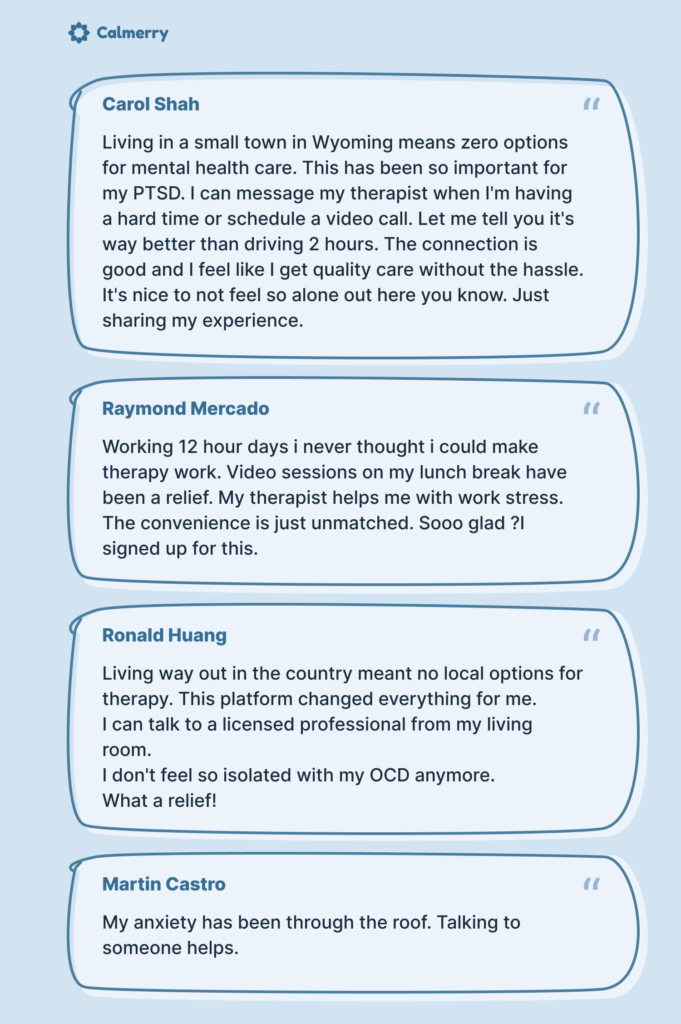
The Future is empathetic and smart
The future of mental health combines human compassion and AI precision. Counseling platforms and AI-based mental health apps offer low costs, scalability, and ongoing services. AI applications are lacking in empathy, privacy, and ethics.
AI counseling is improving, yet human instinct in mental health care remains. At the core, the human therapist-patient relationship remains the foundation of meaningful progress, where empathy and trust guide recovery. Where tech and old-school counseling meet, AI needs to complement professionally licensed care and not replace.
Start your journey with a licensed therapist today, because your mental health deserves both empathy and innovation.
Babu, A., & Joseph, A. P. (2024). Artificial intelligence in mental healthcare: transformative potential vs. the necessity of human interaction. Frontiers in Psychology, 15. https://doi.org/10.3389/fpsyg.2024.1378904
https://archive.logos-science.com/index.php/conference-proceedings/article/download/2760/2799/2832
Griesser, K. (2025, August 27). Your AI therapist might be illegal soon. Here’s why. CNN. https://edition.cnn.com/2025/08/27/health/ai-therapy-laws-state-regulation-wellness
online therapy
live video session

